Although a rather tricky field, mathematics is fundamental in many areas.
Fortunately, enhancing your math skills to achieve your professional goals is possible. The best way to become more confident working with numbers is to take math training courses.
I have experienced some math courses and compiled the ten online courses below. After taking the courses below, you will understand and be more confident in the face of this complicated subject.
1. Introduction to Calculus
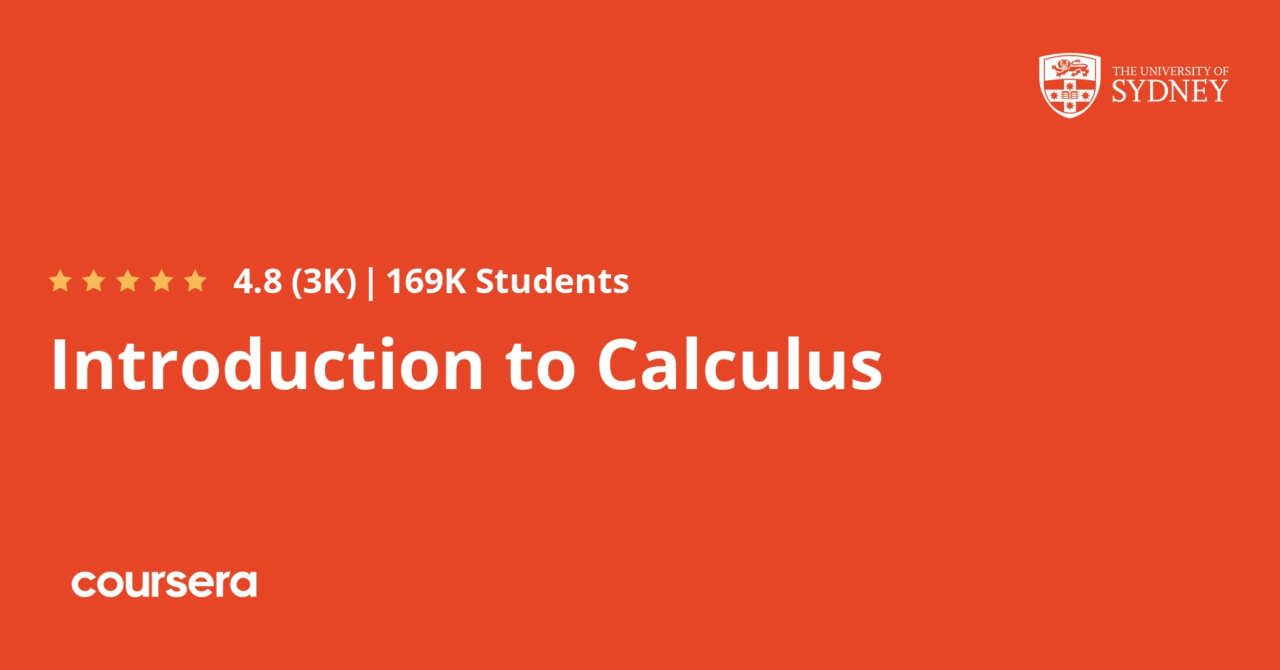
Specifications:
- Difficulty: Intermediate.
- Duration: 59 hours.
- Price: Free.
- Provider: The University of Sydney.
Course’s Highlights
Introduction to Calculus helps learners understand essential mathematical foundations and their applications in today’s life. It is the reason why I always recommend this course to anyone interested in math.
In the first lectures, the course taught me about the applicability of essential functions and equations. Over the next few weeks, I learned about integral calculus, such as tangents, derivatives, differentials, and integrals.
The Introduction to Calculus knew how to explain and convey knowledge effectively. Besides things related to calculus, the course also covers exciting information about the history of calculus.
Introduction to Calculus is an exciting course to master arithmetic and better understand the field’s developments.
To keep up with the teaching pace and complete the course, you’d best have basic math knowledge. It is a big drawback for those who have never known calculations such as differentials and integrals.
Enroll Here: https://www.coursera.org/learn/introduction-to-calculus
Pros
- Good mix of theory and exercises
- Provide a wealth of information about calculus
- Explain knowledge in detail and are easy to understand.
- Help learners understand essential mathematical foundations.
- Create a solid foundation to follow the subsequent courses.
Cons
- Requires learners to have basic math knowledge.
2. Linear Algebra
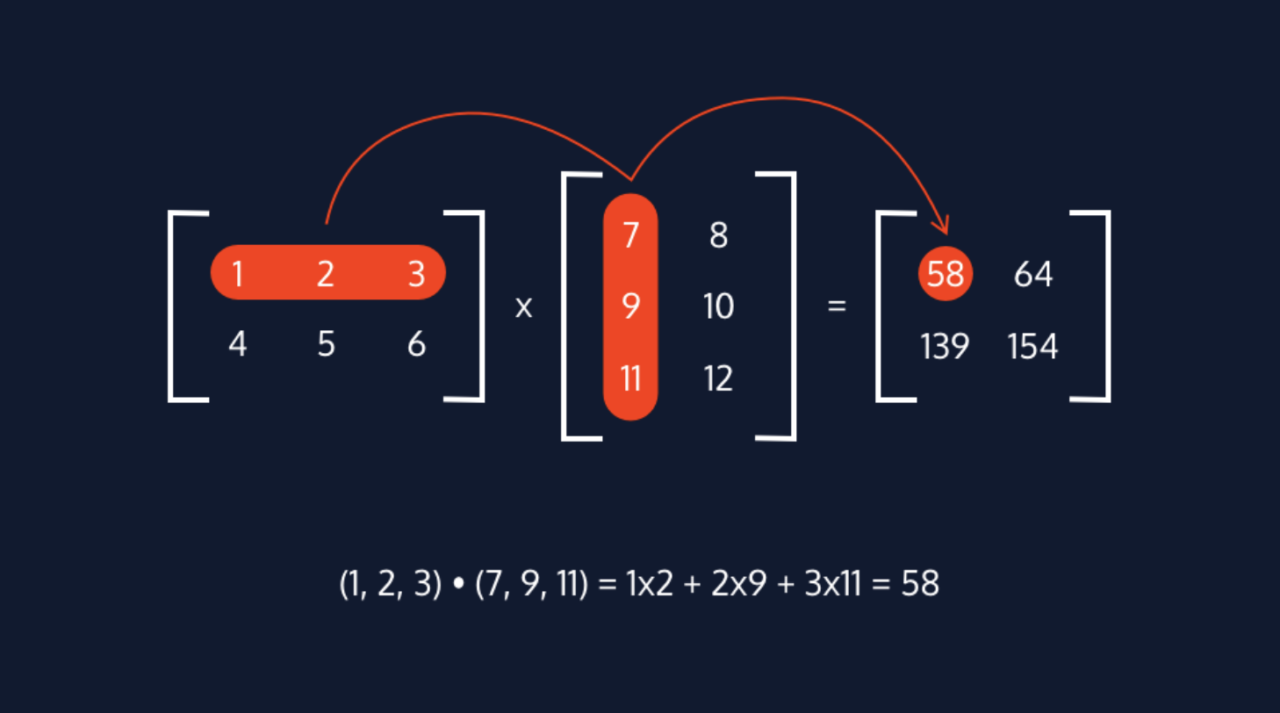
Specifications:
- Difficulty: Beginner.
- Duration: 2 hours.
- Price: Free.
- Provider: Codecademy.
Course’s Highlights
Linear Algebra focuses on the fundamentals: scalars, vectors, and matrices. These basic linear algebraic structures are in great detail throughout the course.
Even the knowledge I gained after completing Linear Algebra benefited me when I signed up for a course related to deep learning.
It only took me about 2 hours to complete the course. Although the time was short, it was enough for me to learn about vectors, basic vector operations, matrices, and operations in matrices.
I am pretty satisfied with the content included in the course. My only complaint is that the first lectures took quite a while to introduce linear algebra. This theory is quite lengthy and does not attract or interest me.
Enroll Here: https://www.codecademy.com/learn/learn-linear-algebra
Pros
- The course duration is short.
- Refer to the basic structure of linear algebra
- It is the foundation for the study of deep learning.
- A detailed introduction to basic vector operations
- Many practice exercises of varying difficulty
Cons
- The theoretical introduction to linear algebra is quite lengthy.
3. Math For Programmers

Specifications:
- Difficulty: Intermediate.
- Duration: 5h 16m.
- Price: $19 per month after a 10-day trial.
- Provider: Simon Robinson.
Course’s Highlights
If you are a programmer looking to learn more about math or read binary and hexadecimal numbers, Math For Programmers is the course you should sign up.
Unlike the courses I introduced, Math For Programmers focuses on providing mathematical knowledge related to storing and processing data on computers.
I was pretty impressed with the lectures on how to read binary and hexadecimal systems. These lectures cover comma placement in detail and its use limitations.
The curriculum also taught me about numeric and boolean operations. These insights are interesting to anyone curious about how computers store data.
With lectures like the above, Math For Programmers will be an exciting course for anyone working in computer science and data science.
If you want to improve your calculation skills and understanding of basic math, you probably won’t be too satisfied with this course.
Enroll Here: https://www.pluralsight.com/courses/math-for-programmers
Pros
- Suitable for programmers.
- Lectures are detailed and easy to understand.
- Introduction to binary and hexadecimal reading
- Teaching about number manipulation and boolean.
- An introduction to how computers store data
Cons
- Not suitable for beginners.
4. Algebra: Elementary to Advanced
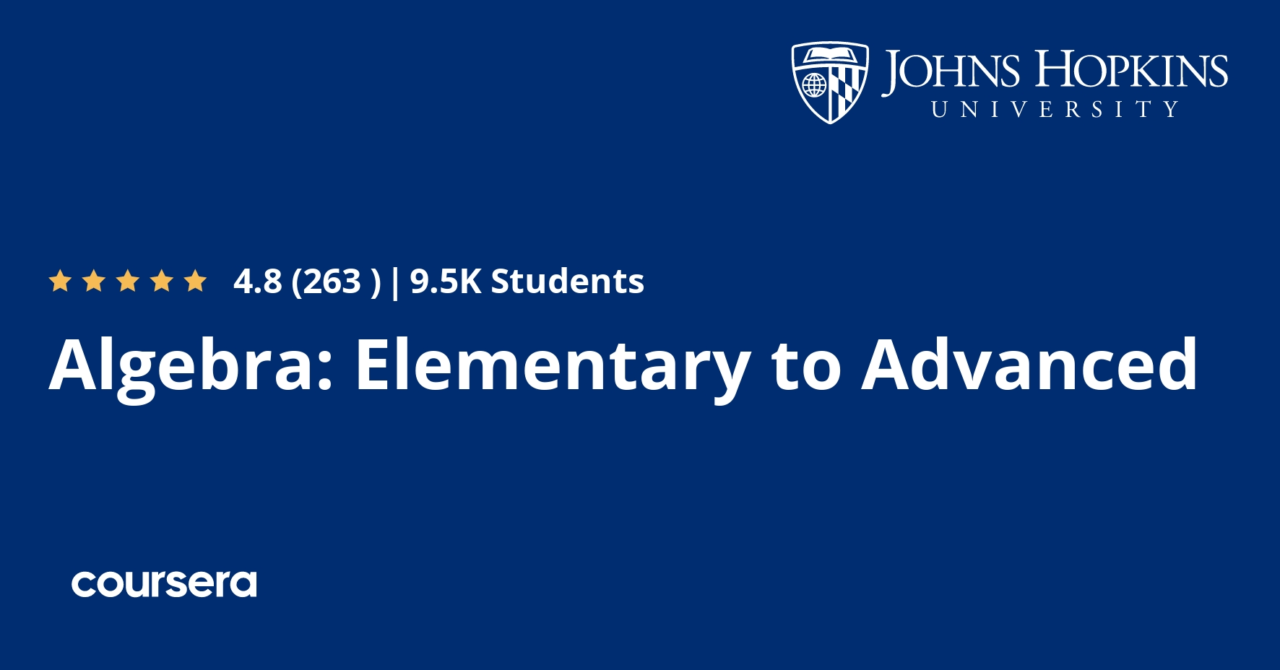
Specifications:
- Difficulty: Beginner.
- Duration: 4 months.
- Price: Free.
- Provider: Johns Hopkins University.
Course’s Highlights
The Algebra: Elementary to Advanced Specialization is one of the most detailed and exciting courses I’ve ever taken. It covers all the essential aspects of algebra: solving linear equations, numeric types, and multifunction properties.
This course does not simply provide theory. It also includes exercises of varying difficulty for me to practice the skills I’ve learned.
I was particularly impressed with the exercises related to data modeling. They are pretty interesting, valuable, and highly applicable.
In addition to exciting exercises, the course also requires learners to complete activities of great difficulty. I understand it is a challenge for learners to apply the knowledge gained from the system. However, this significant problem inadvertently affects the participants’ interest in learning.
Enroll Here: https://www.coursera.org/specializations/algebra-elementary-to-advanced
Pros
- Many detailed lectures.
- Lots of practice exercises.
- Emphasis on data modeling.
- Cover all the essential aspects of algebra
- Contribute to building mathematical thinking.
Cons
- Many lessons are of great difficulty.
5. Introduction to Mathematical Thinking
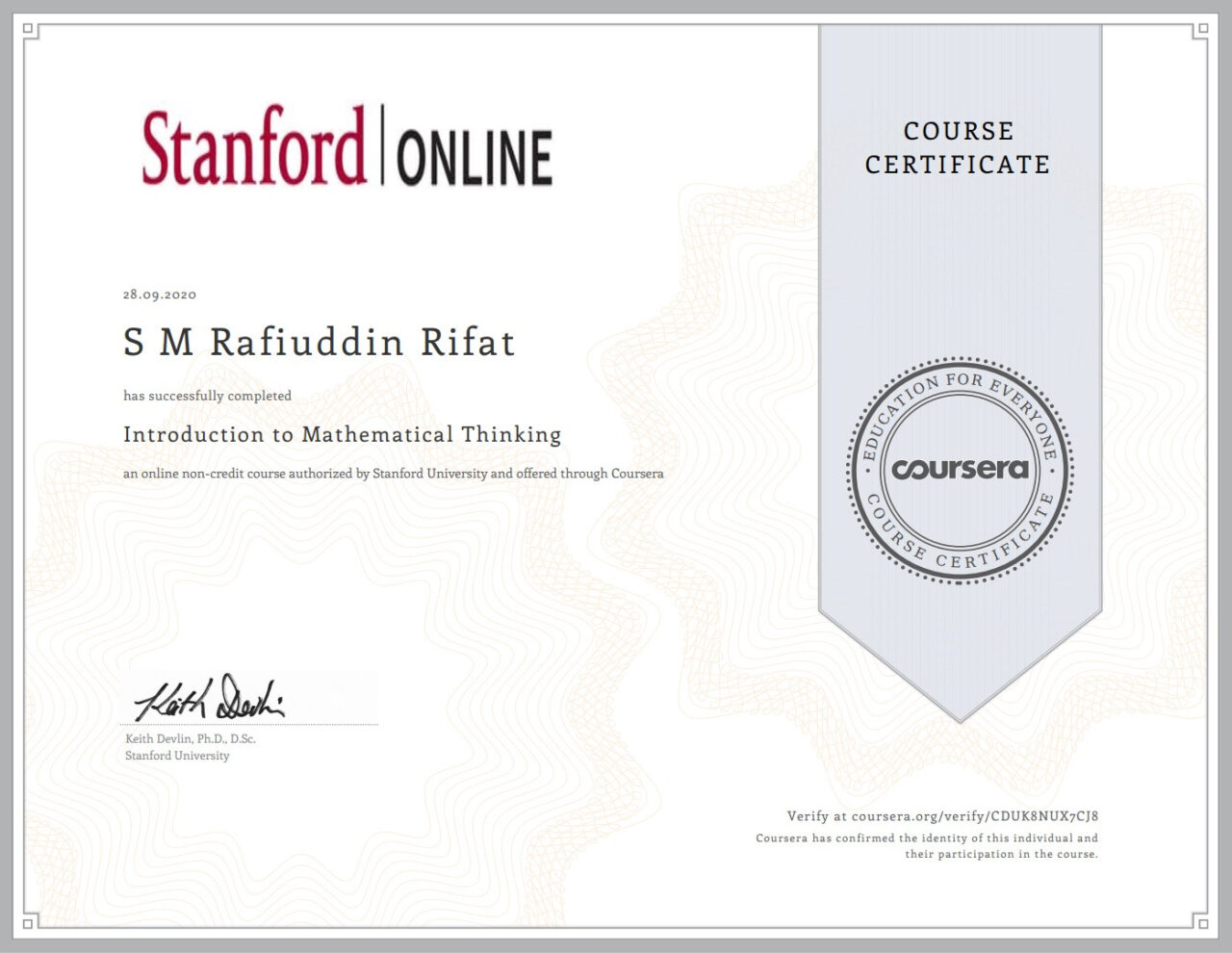
Specifications:
- Difficulty: Intermediate.
- Duration: 39 hours.
- Price: Free.
- Provider: Stanford University.
Course’s Highlights
Thinking and problem-solving from professional mathematicians are very different from the usual cases. And with Introduction to Mathematical Thinking, I was taught how to perceive and process the way mathematicians do.
This course doesn’t delve into math-related knowledge. Instead, it teaches how to study effectively and solve math problems.
I was particularly impressed with how the course deals with number theory. These lectures exemplify mathematical thinking while being relevant to physics and essential areas of technology today.
I had to complete real-world mathematical reasoning assessments. It was quite a fun activity that helped me experience being a mathematician.
This course focuses on training, thinking and problem-solving. So, if you expect it to provide basic calculus knowledge and exercises to practice working with numbers, Introduction to Mathematical Thinking will not be the ideal choice.
Enroll Here: https://www.coursera.org/learn/mathematical-thinking
Pros
- Detailed and exciting lectures.
- A guide to practical study.
- It helps train math thinking like an expert.
- Lessons related to physics and technology.
- New mathematical reasoning assessment exercise.
Cons
- It doesn’t teach math or working with numbers.
6. Mathematics for Engineers
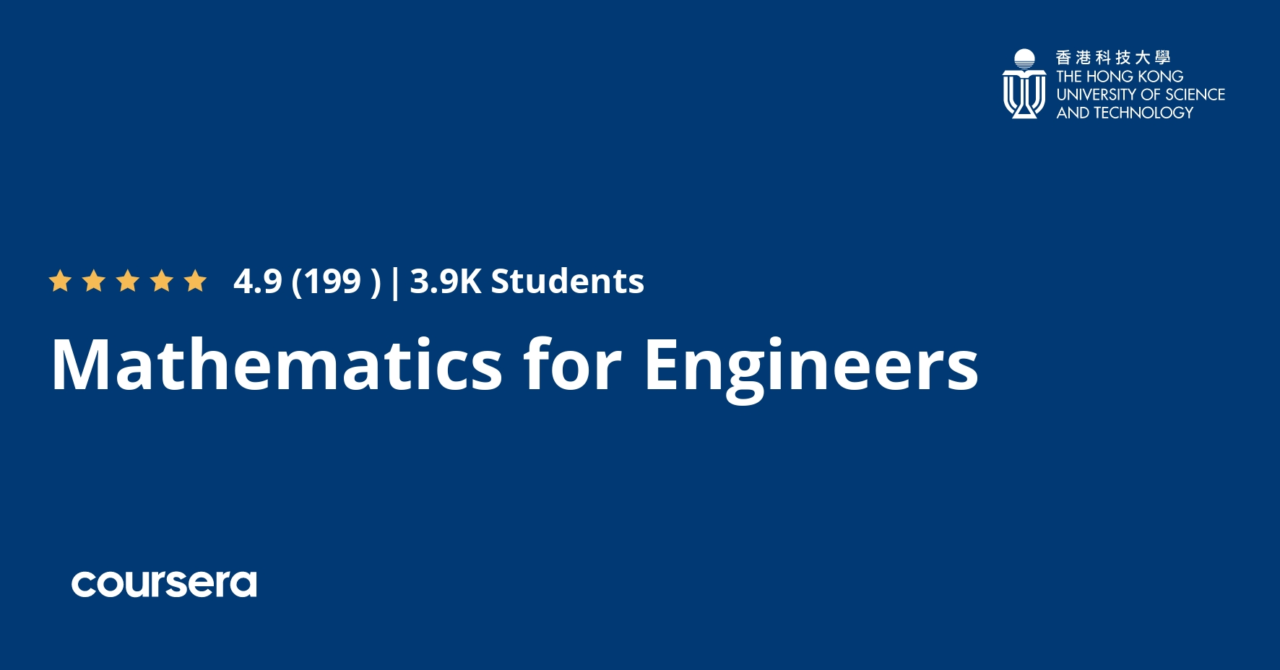
Specifications:
- Difficulty: Beginner.
- Duration: 6 months.
- Price: Free.
- Provider: The Hong Kong University of Science and Technology.
Course’s Highlights
As the name suggests, this course is specifically for those who want to learn technical math independently.
During my 6 months, I have studied and learned in depth about algebraic matrices, fundamental operations in algebra, and differential equations.
More specifically, the course also teaches MATLAB programming. This relatively novel content is of great help to engineering math enthusiasts.
I also receive requests to write MATLAB programs to solve real-world problems. This content will interest every engineer who has a background in physics.
Yet, if you are not an engineering student, you may find the content in the course dull and not highly applicable.
Enroll Here: https://www.coursera.org/specializations/mathematics-engineers
Pros
- Teaches MATLAB programming
- Detailed and engaging lectures.
- Teaching theory and applied exercises.
- A guide to algebraic matrices and vector operations
Cons
- Boring for the uninitiated.
7. Fundamental Math for Data Science
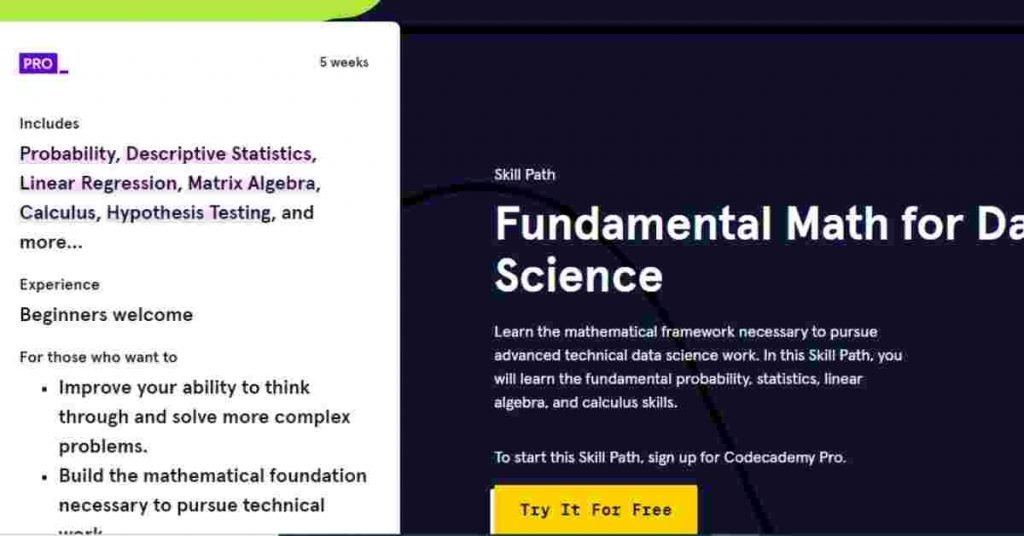
Specifications:
- Difficulty: Beginner.
- Duration: 5 weeks.
- Price: Free.
- Provider: Codecademy.
Course’s Highlights
Mathematics is an essential foundation for pursuing a career in data science. To get the knowledge, you can sign up for Fundamental Math for Data Science.
This one covers the basics of probability, statistics, and algebra. I had almost no difficulty during my studies with Fundamental Math for Data Science.
Lectures are always relatively easy to understand, focusing on applicability. Even beginners who know little about math operations can complete this course.
Besides the advantages, Fundamental Math for Data Science still has some disadvantages that must be overcome. For example, it lacks practical exercises or end-of-course projects to improve my skills.
Enroll Here: https://www.codecademy.com/learn/paths/fundamental-math-for-data-science
Pros
- Focus on applicability.
- Suitable even for beginners.
- Easy-to-understand lectures.
- Provide the basic knowledge.
- As a foundation for further research in data science.
Cons
- Need more practice exercises.
8. Mathematics for Machine Learning
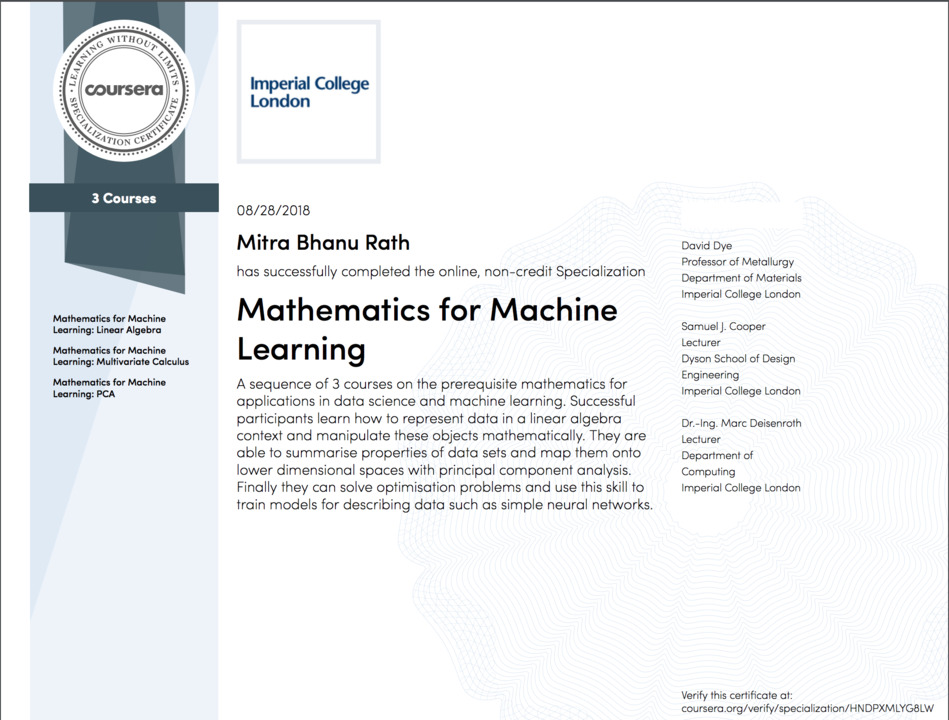
Specifications:
- Difficulty: Beginner.
- Duration: 4 months.
- Price: Free.
- Provider: Imperial College London.
Course’s Highlights
If you are learning about machine learning and computer science, you will undoubtedly understand the importance of basic math knowledge.
If you struggle with existing math knowledge to your machine-learning work, Mathematics for Machine Learning Specialization is the course you should take.
Mathematics for Machine Learning Specialization supports basic math knowledge and covers content related to machine learning and data science.
All of its lectures, from linear algebra to multivariate analysis, have something to do with data. In short, all the knowledge I gained after completing the course helped my journey to learn about machine learning.
My only difficulty is dimensionality reduction and principal component analysis lectures. To complete these exercises, you’d better have knowledge of Python.
Enroll Here: https://www.coursera.org/specializations/mathematics-machine-learning
Pros
- Detailed lecture.
- Much related to data science.
- Help with machine learning research journey.
- Provide mathematical background knowledge.
- Link math knowledge to work related to machine learning.
Cons
- Some lectures require knowledge of Python.
9. Introduction to Complex Analysis
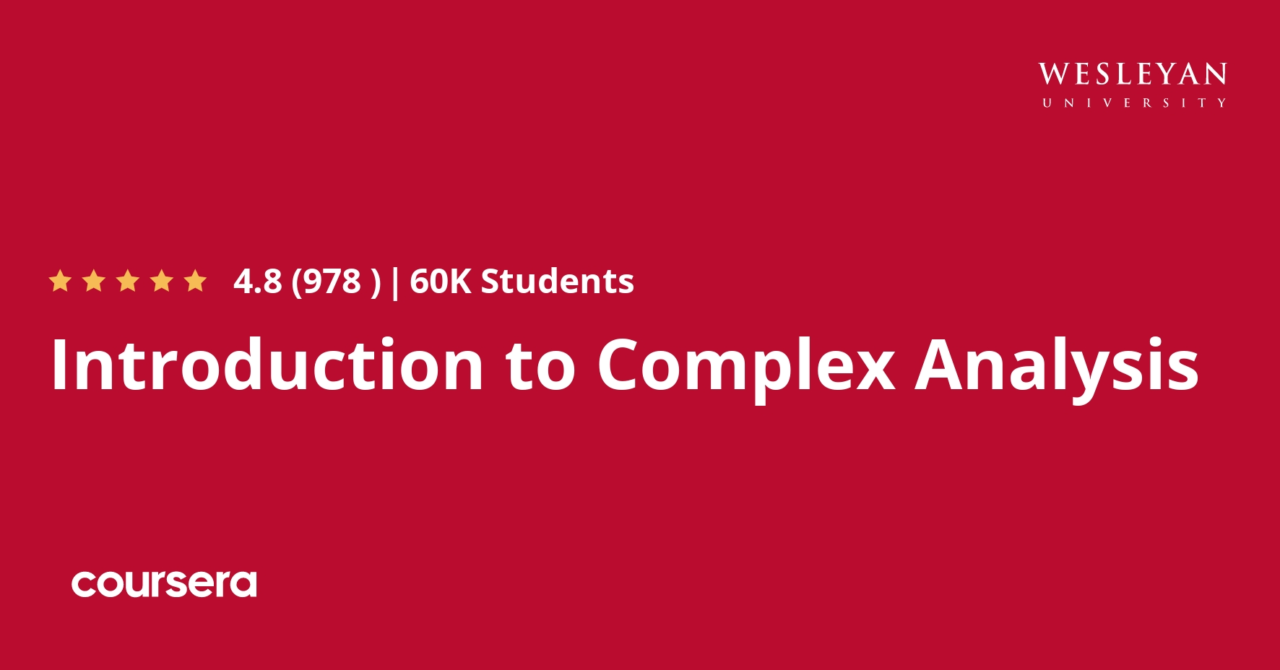
Specifications:
- Difficulty: Intermediate.
- Duration: 27 hours.
- Price: Free.
- Provider: Wesleyan University.
Course’s Highlights
Sign up for Introduction to Complex Analysis, and you will learn all the essential knowledge about complex analysis, complex functions, and complex variables.
Although it is a small branch of mathematics, its practical application is relatively high. I am also quite excited about the knowledge covered by the course.
The lecture is quite detailed and interesting for learners, even those who do not understand complex variables well.
Accompanying the video lectures are questions and exercises. These assignments are graded fully automatically. So, after completing the training, I immediately got the results, and there was a change in my study method.
Introduction to Complex Analysis is quite interesting if you are interested in learning about complex numbers. Yet, it won’t be able to satisfy the need to know about broader fields like calculus.
Enroll Here: https://www.coursera.org/learn/complex-analysis
Pros
- High applicability.
- Detailed and exciting lectures.
- Many activities help practice skills.
- Focus on introducing complex numbers.
- Automated grading exercises for quick results.
Cons
- Only available to minor mathematical branches.
10. Introduction to Statistics
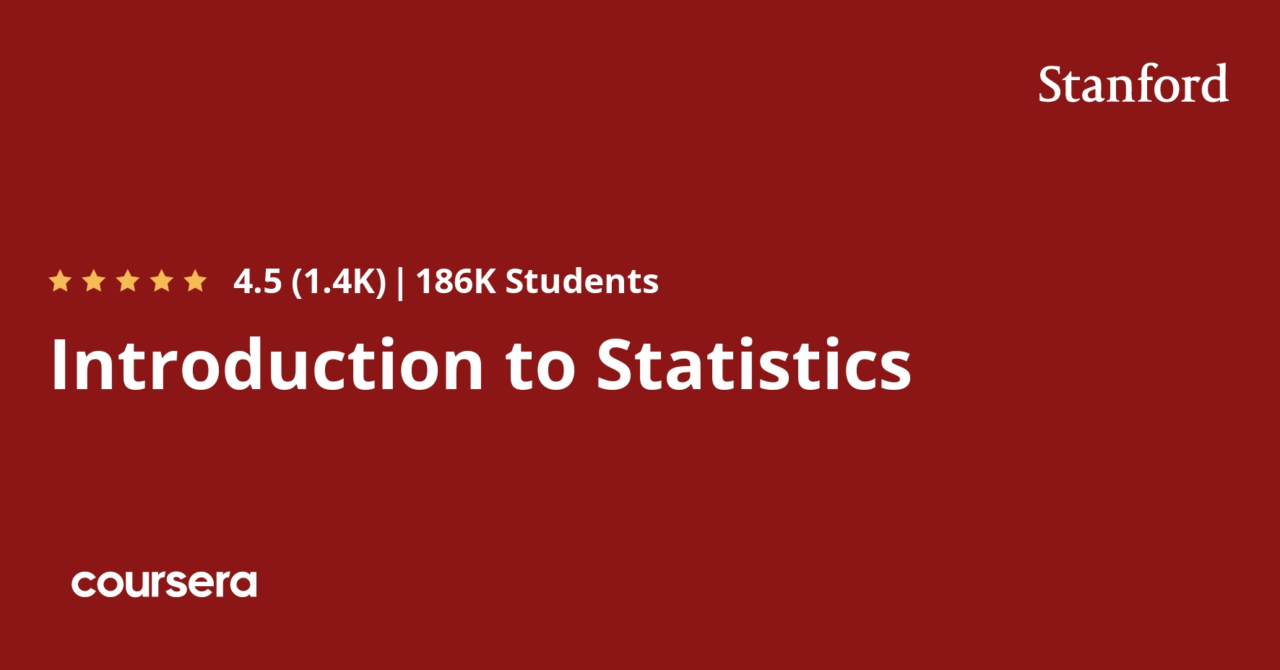
Specifications:
- Difficulty: Beginners.
- Duration: 15 hours.
- Price: Free.
- Provider: Stanford University.
Course’s Highlights
Introduction to Statistics did not teach me how to calculate. Instead, it introduces statistical thinking. Its lectures focus on teaching the use of tools in descriptive statistics to visualize information.
After completing the course, I solved several different statistical problems. Its lectures on inference, regression, or regression normalization are also quite interesting, helping me greatly in my practical work.
Despite receiving much praise, Introduction to Statistics still has some problems. One of them is its difficulty. The vendor says it’s suitable for beginners. Yet, to complete the course well, I recommend learning about computer basics and productivity software.
Enroll Here: https://www.coursera.org/learn/stanford-statistics
Pros
- Practice statistical thinking.
- Fascinating, highly practical knowledge
- Many exercises with different difficulties.
- A guide to using descriptive statistics tools
- Learners can solve problems with a more explicit mindset.
Cons
- Require basic computer knowledge and productivity software
Learning Guide

- Course Scope: Mathematics is a rather broad field. And a convenient course will cover only a few key areas. Consider your learning needs to choose the proper topic range.
- Instructor: The instructor has a vital role in providing knowledge to the learners. I am interested in courses taught by university lecturers with exciting content and enthusiastic teachers delivering engaging content.
- Course Level: Some systems will require students to have a basic knowledge of algebra. Meanwhile, some other options are for beginners. Find methods that are suitable for your level to avoid difficulties in the process of acquiring knowledge.
FAQs
What is a helpful tool for learning mathematics?
The best tools for learning math include GeoGebra, Geometry Pad, Khan Academy, and Shapes 3D.
What math is the best basic or standard?
The difficulty level of basic math will be slightly lower than the standard level.
What happens if we take basic math?
By choosing basic math, you can better study related fields like computer science, physics, biology, and chemistry.
Do we need standard math for science?
It would help if you studied math to be able to pursue other sciences.
Which math is hardest?
The Riemann conjecture is a Millennium problem relevant to all areas of mathematics. They give a reward of 1 million dollars to the person who finds the solution to it.
Final Thoughts
If you want to understand essential math foundations, Introduction to Calculus is the course you should sign up for.
Meanwhile, specialized courses in this field, like Mathematics for Machine Learning Specialization, will satisfy you if you work in computer science.
Depending on your learning goals, you will have your best choice. Hopefully, the list above have been of help to your learning process.
